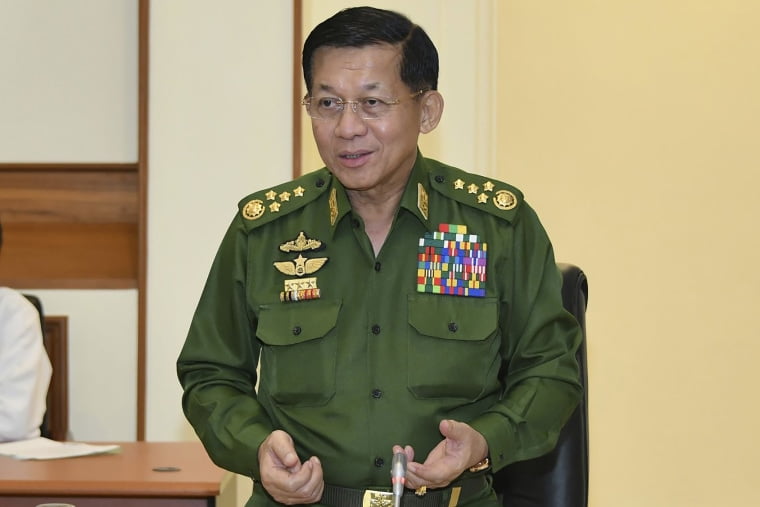Delve into the evolving power struggle in Myanmar as calls for the junta leader’s resignation gain momentum amid rebel advances. Learn about the challenges facing Min Aung Hlaing and the uncertain future of the nation’s political stability.
Following a string of military setbacks due to a broad attack by rebel factions, calls for Min Aung Hlaing’s resignation seem to be intensifying.

At a small gathering in a Myanmar cantonment town in mid-January, hard-line pro-military monk Pauk Kotaw proposed that Min Aung Hlaing, the head of the country’s junta, stand down and be replaced by his deputy. Videos of the event shared on social media appear to show the crowd cheering in agreement.
Online, military-friendly bloggers and journalists have been just as forthright. A YouTuber who supports the military named Ko Maung Maung wrote, “He should resign as commander-in-chief.”
A few months ago, such statements against the head of Myanmar’s military forces and the country’s powerful junta leader would have been unimaginable.
However, Min Aung Hlaing finds himself in his weakest position since toppling Nobel laureate Aung San Suu Kyi’s democratically elected government on February 1, 2021, following his dawn coup d’état takeover.
Questions about the 67-year-old’s leadership are being asked after a series of battlefield defeats for the military in a sweeping offensive by rebel groups that started in October, dubbed Operation 1027.
According to the media group Myanmar Peace Monitor, the junta has lost control of at least 35 towns thus far, but fighting close to the Chinese border has stopped thanks to a ceasefire mediated by Beijing. There is still fighting in other areas.
The junta has admitted some loss of land in the past, however it has not discussed specifics on losses on the battlefield. In order to give the military more time to complete activities aimed at “restoring the nation to a normal state of stability and peace,” Min Aung Hlaing prolonged the state of emergency on Wednesday, the eve of the coup anniversary, for an additional six months.
When Reuters called the junta to ask for comment, a spokesman did not answer.
Even still, it remains to be seen if Min Aung Hlaing—or his present deputy Soe Win—would be forced out of office and who will succeed him given the army’s casualties in combat.
But the incidents have hurt Min Aung Hlaing’s reputation as well as that of the Tatmadaw, the military of Myanmar, which the United Nations says is violating human rights in the nation on a regular basis.
Senior Myanmar adviser for the Crisis Group Richard Horsey stated, “Its poor showing on the battlefield is seen as shameful by nationalists and other military supporters who have launched unprecedented public criticism of Commander-in-Chief Min Aung Hlaing’s leadership.”
According to a Reuters analysis of several social media posts from recent weeks, pro-junta journalists are among those challenging the regime and its head.
After the town of Laukkai fell during Operation 1027 in early January, Moe Hein, who frequently appears on state television and operates the pro-junta news outlet Thuriya Nay Wun, expressed reservations about the senior leadership of the military.
“Everyone, from the troop commanders to the commander in chief, determines whether we win or lose in a battle,” he posted on Facebook.
The military is “being pressured on multiple fronts, has lost substantial territory and control of a number of towns, and appears to be suffering from low morale and poor leadership,” according to Scot Marciel, a former US ambassador to Myanmar.
Following the coup, the junta said in a roadmap that elections will take place by August 2023.
However, public anger quickly spiraled out of hand, and the military tried to forcibly put an end to it. This resulted in widespread armed uprisings, which are currently joining forces with long-standing rebel groups to oppose the junta.
Alongside, international investment has dried up since the coup and Western sanctions have taken effect, further weakening Myanmar’s economy already devastated by decades of military control.
The National Unity Government (NUG), composed of members of Suu Kyi’s party, and three rebel factions affiliated with it released a statement on Wednesday indicating that they were willing to engage in talks with the military provided six requirements were fulfilled.
Putting an end to military engagement in politics and placing the armed forces under civilian government control are two of these.
The letter also stated that other factions, including the NUG, aim to create a federal democratic union.
The NUG declaration elicited no instant response from the junta.
The opposition faces a short window of opportunity before fighting almost stops when the monsoon rains start in June.
Still, Marciel said, the resistance “now has a very real chance to defeat the military, at least in terms of forcing the military to surrender substantial political power.”
“However, it is hard to estimate how long this might take.”
Conclusion
The dynamics of power in Myanmar are shifting as Min Aung Hlaing’s leadership faces unprecedented challenges. The junta’s control is increasingly contested, raising questions about the nation’s future political landscape and the potential for democratic reforms. Amidst escalating tensions, Myanmar stands at a crossroads, with the outcome of this struggle shaping its trajectory for years to come.
Connect with us for the Latest, Current, and Breaking News news updates and videos from thefoxdaily.com. The most recent news in the United States, around the world , in business, opinion, technology, politics, and sports, follow Thefoxdaily on X, Facebook, and Instagram .
